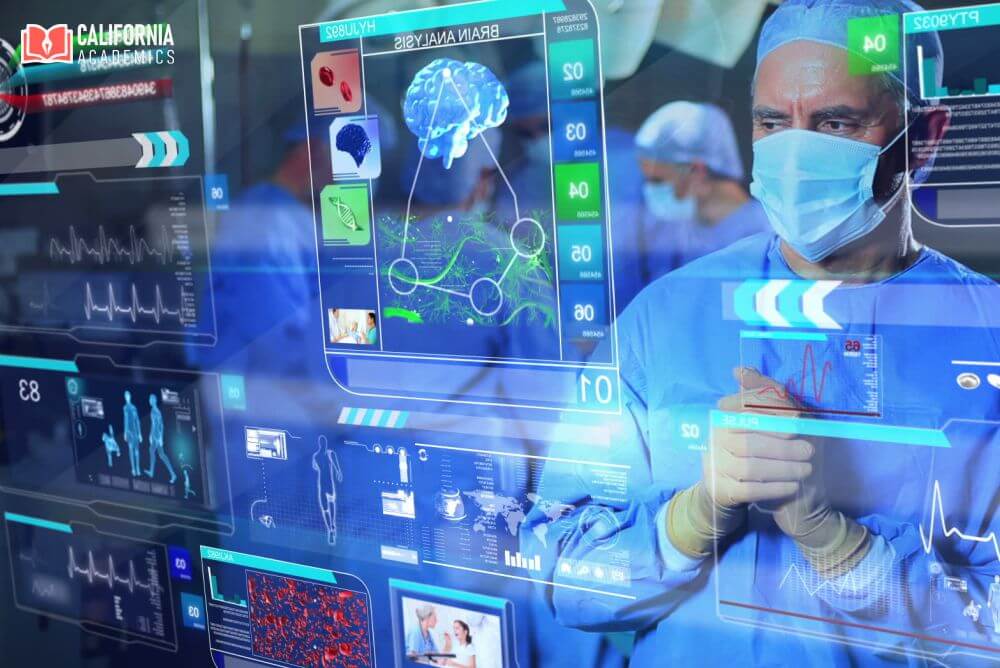Artificial intelligence (AI) has revolutionized various industries, and its impact on medical research is no exception. With its ability to analyze vast amounts of data, recognize patterns, and make intelligent predictions, AI holds great promise for advancing medical research and improving patient outcomes. From enhancing data analysis and diagnostics to accelerating drug discovery, AI has the potential to transform the way medical research is conducted. However, along with its potential benefits, AI also raises ethical considerations and challenges that need to be carefully addressed. This article explores the impact of AI in medical research, discussing its applications, advantages, limitations, ethical considerations, integration into clinical practice, and future perspectives.
Understanding Artificial Intelligence in Medical Research
Artificial intelligence (AI) refers to the development of computer systems that can perform tasks that typically require human intelligence, such as problem-solving, decision-making, and pattern recognition. In the context of medical research, AI is revolutionizing the way data is analyzed, diagnoses are made, and research is conducted. AI algorithms can process large volumes of medical data, including electronic health records, medical images, and genomic information, to identify patterns, make predictions, and generate valuable insights.
AI techniques, such as machine learning and deep learning, enable researchers to uncover hidden correlations and trends in data, leading to more accurate diagnoses, personalized treatment plans, and improved patient outcomes. AI-powered tools can also aid in drug discovery by predicting drug-target interactions, analyzing molecular structures, and identifying potential therapeutic compounds.
However, understanding AI in medical research requires addressing challenges such as data quality, privacy, and algorithm bias. Ethical considerations, including informed consent and transparency, are crucial when utilizing AI in patient care and research. Moreover, integrating AI into clinical practice requires collaboration between researchers, healthcare providers, and technology experts to ensure effective implementation and address regulatory and legal frameworks.
Overall, understanding AI’s potential and limitations in medical research is essential for harnessing its benefits while addressing ethical and practical considerations.
AI Applications in Medical Research
Artificial intelligence (AI) applications in medical research have the potential to revolutionize various aspects of the healthcare industry. AI algorithms can analyze large datasets and uncover patterns that may not be readily apparent to human researchers. Here are some key applications of AI in medical research:
- Diagnosis and decision support: AI algorithms can analyze patient data, including medical images and electronic health records, to assist in diagnosing diseases and recommending treatment options. This can improve diagnostic accuracy and support healthcare providers in making informed decisions.
- Drug discovery and development: AI can accelerate the drug discovery process by analyzing vast amounts of biomedical data, predicting drug-target interactions, and identifying potential candidates for drug development. This can significantly reduce the time and cost associated with bringing new drugs to market.
- Precision medicine: AI can facilitate personalized treatment plans by analyzing individual patient characteristics, including genetic and genomic data, to tailor therapies to specific patient profiles. This can lead to more effective and targeted treatments.
- Clinical trial optimization: AI algorithms can help optimize clinical trial design and patient recruitment, improving the efficiency and effectiveness of research studies.
- Disease prediction and prevention: AI models can predict the likelihood of developing certain diseases based on various risk factors, enabling early intervention and preventive measures.
These applications demonstrate the potential of AI to enhance medical research, improve patient outcomes, and advance the field of healthcare.
Advantages and Limitations of AI in Medical Research
Artificial intelligence (AI) offers several advantages in medical research, but it also comes with certain limitations. Here are some key benefits and limitations of AI in medical research:
Advantages:
- Data analysis: AI algorithms can analyze large volumes of medical data quickly and accurately, identifying patterns and correlations that may not be easily detectable by human researchers. This can lead to new insights and discoveries in medical research.
- Efficiency and speed: AI can automate repetitive tasks, such as data collection and analysis, allowing researchers to focus on more complex and critical aspects of their work. This can accelerate the research process and save time.
- Personalized medicine: AI can analyze individual patient data, including genetic information, medical history, and lifestyle factors, to develop customized treatment plans. This can lead to more targeted and effective healthcare interventions.
Limitations:
- Data quality and bias: AI relies on high-quality and unbiased data to generate accurate results. If the input data is incomplete, inaccurate, or biased, it can impact the reliability of AI outcomes.
- Ethical considerations: AI raises ethical concerns regarding patient privacy, informed consent, and the potential for bias in decision-making algorithms. Safeguarding patient rights and ensuring transparency and accountability are crucial.
- Lack of human intuition and judgment: AI algorithms may lack the human instinct and determination needed to interpret complex medical scenarios or make context-dependent decisions. Human expertise and oversight are still essential in medical research.
- Generalizability: AI models trained on specific datasets may struggle to generalize their findings to diverse patient populations or different healthcare settings. Validation and testing across various people are necessary.
Understanding these advantages and limitations is crucial for researchers and healthcare professionals to harness the potential of AI while mitigating its challenges in medical research.
Ethical Considerations in AI-driven Medical Research

Ethical considerations play a crucial role in AI-driven medical research to ensure the responsible and ethical use of technology. Here are some key ethical considerations in AI-driven medical research:
- Privacy and confidentiality: AI algorithms require access to sensitive patient data, raising concerns about privacy and confidentiality. Researchers must ensure appropriate data protection measures are in place, including anonymization and secure storage, to safeguard patient privacy.
- Informed consent: Obtaining informed consent from patients for the use of their data in AI research is essential. Patients should be informed about how their data will be used, the potential risks and benefits, and the option to withdraw their consent at any time.
- Bias and fairness: AI algorithms can inadvertently inherit biases from the data they are trained on, leading to unfair or discriminatory outcomes. Researchers must address and mitigate biases to ensure fairness and equity in AI-driven medical research.
- Transparency and explainability: AI algorithms can be complex and opaque, making it challenging to understand how they arrive at their decisions. Ensuring transparency and explainability of AI models is essential for researchers, healthcare professionals, and patients to understand and trust the outcomes.
- Accountability and responsibility: Researchers and developers of AI systems have a responsibility to ensure the accuracy, reliability, and safety of their algorithms. This includes regular monitoring, validation, and addressing any potential biases or errors that may arise.
- Human oversight and intervention: While AI can assist in medical research, human oversight, and intervention remain critical. Researchers should exercise professional judgment and have mechanisms in place to intervene if the AI system produces unexpected or questionable results.
By addressing these ethical considerations, AI-driven medical research can benefit from the potential of technology while upholding ethical standards, protecting patient rights, and promoting trust in the research community.
AI Integration in Clinical Practice and Healthcare Systems
The integration of artificial intelligence (AI) in clinical practice and healthcare systems has the potential to revolutionize patient care and improve healthcare outcomes. Here are some critical aspects of AI integration in clinical practice:
- Diagnostic support: AI algorithms can analyze medical images, such as X-rays and MRIs, with high accuracy, aiding in the detection and diagnosis of diseases. This can help healthcare providers make more informed decisions and improve diagnostic accuracy.
- Predictive analytics: AI models can analyze large datasets and identify patterns and trends that may not be apparent to human clinicians. This can help predict patient outcomes, identify high-risk individuals, and optimize treatment plans for better patient management.
- Treatment optimization: AI algorithms can assist in personalized treatment recommendations by considering patient-specific factors such as medical history, genetic data, and treatment response. This can help tailor therapies and improve treatment outcomes.
- Remote monitoring and telemedicine: AI-powered devices and applications can enable remote monitoring of patient’s health conditions, allowing healthcare providers to intervene proactively and provide timely care. Telemedicine platforms can also leverage AI to enhance virtual consultations and enable remote diagnosis and treatment.
- Workflow optimization: AI technologies can automate routine administrative tasks, such as documentation and scheduling, freeing up healthcare providers’ time for more direct patient care. This can improve efficiency, reduce administrative burdens, and enhance overall healthcare delivery.
However, integrating AI into clinical practice and healthcare systems also poses challenges. These include data privacy and security concerns, ensuring regulatory compliance, addressing biases in algorithms, and maintaining appropriate human oversight. Adhering to ethical guidelines and regulations is essential to harness the full potential of AI while ensuring patient safety and maintaining trust in healthcare systems.
Future Perspectives and Challenges
The future of AI in medical research holds immense potential for advancements in healthcare. Here are some future perspectives and challenges:
- Enhanced diagnostics and personalized medicine: AI has the ability to analyze complex patient data and identify subtle patterns that can lead to early disease detection and personalized treatment approaches. This can revolutionize diagnostics and improve patient outcomes.
- Drug discovery and development: AI algorithms can accelerate the drug discovery process by analyzing vast amounts of data and identifying potential drug candidates. This can lead to faster and more efficient drug development, ultimately benefiting patients.
- Precision medicine and predictive analytics: AI can help predict disease progression, treatment response, and patient outcomes by integrating multiple data sources and generating predictive models. This can aid in delivering more targeted and effective interventions.
- Ethical considerations: As AI becomes more integrated into healthcare, addressing ethical challenges becomes crucial. Ensuring privacy, transparency, and maintaining human oversight are essential considerations to build trust in AI-driven medical research.
- Data quality and bias: AI relies heavily on high-quality and diverse data. Ensuring data accuracy, addressing biases, and maintaining data integrity are ongoing challenges that need to be addressed for reliable AI applications.
- Regulatory framework and standards: Establishing robust regulatory frameworks and standards for AI in medical research is essential to ensure patient safety, data privacy, and ethical use of AI technologies.
AI has the potential to revolutionize medical research and transform healthcare. While there are challenges to overcome, addressing them through collaboration between researchers, healthcare providers, policymakers, and regulatory bodies can lead to a future where AI-driven advancements in medical research benefit patients worldwide.
In conclusion, the impact of artificial intelligence in medical research is poised to reshape the healthcare landscape. From improved diagnostics and personalized medicine to drug discovery and predictive analytics, AI offers a range of opportunities for advancing healthcare outcomes. However, it is crucial to address ethical considerations, ensure data quality, and establish robust regulatory frameworks to maximize the potential of AI in medical research.
California Academics is a leading institution in the field of medical research paper writing services. With their expertise and dedication, they assist researchers and academicians in effectively communicating their findings, adhering to ethical standards, and navigating the complex landscape of scientific publishing. Their commitment to excellence and integrity makes them a trusted partner in advancing the dissemination of medical knowledge.
